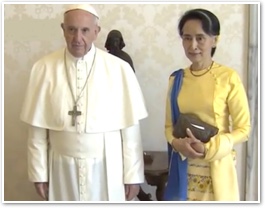Why the Pope refused to say 'Rohingya'
- FATHER RAYMOND J. DE SOUZA
The Rohingya persecution in Myanmar (Burma) is a complex religious liberty issue that challenges the way we often think.
 Myanmar has a Buddhist majority. The Rohingya are a minority Muslim population in Rakhine, a western state in Myanmar bordering Bangladesh. For generations the Rohingya have been treated as a foreign element within Myanmar; even to mention their name and acknowledge their existence is considered provocative. In recent months, Myanmar's military has been driving the Rohingya out, with more than 600,000 refugees now in Bangladesh. It is almost the definition of wretched affliction to seek refuge in Bangladesh, itself a country of massive destitution.
Myanmar has a Buddhist majority. The Rohingya are a minority Muslim population in Rakhine, a western state in Myanmar bordering Bangladesh. For generations the Rohingya have been treated as a foreign element within Myanmar; even to mention their name and acknowledge their existence is considered provocative. In recent months, Myanmar's military has been driving the Rohingya out, with more than 600,000 refugees now in Bangladesh. It is almost the definition of wretched affliction to seek refuge in Bangladesh, itself a country of massive destitution.
Worldwide condemnation has rained down on Myanmar for this brutal religious persecution and ethnic expulsion. That is straightforward. The rest is complicated.
Myanmar's civilian leader Aung San Suu Kyi was added to the ranks of those liberation leaders honoured with the Nobel Peace Prize, alongside Lech Walesa of Poland, Nelson Mandela of South Africa, Carlos Belo of East Timor. Now she is decried for not stopping the persecution of the Rohingya. Her judgment evidently is that if she attempted to stop it, the military (which is still largely in control of the country) would simply push her out, with widespread public support. It is not an inspiring judgment.
Pope Francis is visiting Myanmar and Bangladesh this week, in a visit that was planned before the current crisis. In the late summer, he called for solidarity with the Rohingya, condemning "the persecution of our Rohingya brothers," who were being "tortured and killed, simply because they uphold their Muslim faith."
It is certain that the Myanmar government made it clear that it would not welcome any such talk during the papal visit.
The reality of Muslims facing persecution is also an occasion for Christians — who face lethal persecution at the hands of Muslims in many parts of the world — to defend the principle of religious pluralism and the primacy of religious liberty.
Further complicating matters, the leadership of the local Catholic population, also a small minority, has publicly pleaded with Pope Francis not to use the term "Rohingya" while in Myanmar. Their fear is that if the Pope allies the Catholic Church with the Rohingya minority, the military's guns — and the Buddhist majority's ire — will be soon visited upon Catholics.
So on Tuesday Pope Francis spoke generically about respect for the rights of all peoples, all religions, all minorities and for democratic rights. He did not mention the Rohingya by name.
Of course it is not necessary to speak explicitly to make one's meaning clear. You can search the voluminous addresses that Pope John Paul II delivered in his history-changing visit to Poland in June 1979 and not find the word "communism" uttered once. But everyone — the communists above all — knew exactly who he was denouncing on every page. Likewise, Pope Francis has made clear that the Rohingya persecution is just that, and everyone knew what he was speaking about in the country on Tuesday.
Further, it is expected that when the Holy Father visits Bangladesh later this week he will visit the Rohingya refugees himself. Is a visit worth a thousand words?
Still, from our comfortable distance, a thorough-going denunciation would have been welcome. It is imperative that those who can be heard speak on behalf of those who cannot, and that we speak of religious liberty for others, not just ourselves.
Part of the difficulty is that the international community is somewhat flummoxed by the very idea of Buddhist aggression. For many people, whose image of Buddhism is filtered through the lens of the Dalai Lama being feted by Hollywood celebrities, Buddhist aggression seems an oxymoron. So many find it hard to even imagine Buddhist persecution of Muslims — and Christians. Yet it does happen.
Most often it is the mix of religious and national identity, which can lead to religious minorities being regarded as an alien element in the nation. The situation is all the more combustible in Rakhine, which borders Bangladesh, which was explicitly founded — East Pakistan — to be a Muslim state.
Therefore, the Rohingya are important beyond their own desperate plight. The alliance of the state with a particular religion need not lead to persecution — as it no longer does in Britain — but it can be deadly, as it is currently in Russia and Ukraine.
The reality of Muslims facing persecution is also an occasion for Christians — who face lethal persecution at the hands of Muslims in many parts of the world — to defend the principle of religious pluralism and the primacy of religious liberty. Pluralism and liberty are for all.
 This is Meaghen Gonzalez, Editor of CERC. I hope you appreciated this piece. We curate these articles especially for believers like you.
This is Meaghen Gonzalez, Editor of CERC. I hope you appreciated this piece. We curate these articles especially for believers like you.
Please show your appreciation by making a $3 donation. CERC is entirely reader supported.

Acknowledgement
 Father Raymond J. de Souza, "Why the Pope refused to say 'Rohingya'." National Post, (Canada) November 30, 2017.
Father Raymond J. de Souza, "Why the Pope refused to say 'Rohingya'." National Post, (Canada) November 30, 2017.
Reprinted with permission of the National Post and Fr. de Souza.
The Author
Father Raymond J. de Souza is the founding editor of Convivium magazine.
Copyright © 2017 National Post



